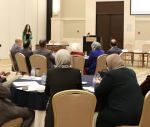You are here
Activists applaud Lower House amendments to Labour Law
By Rana Husseini - Jan 14,2019 - Last updated at Jan 15,2019
AMMAN — Activists on Monday welcomed the Lower House’s endorsement of the 2019 draft amendments to the Labour Law, which included clauses meant to increase female participation in the labour market.
“We have been waiting for this moment for the past seven years… to achieve gender justice, as well as economic and social justice among employers,” said SADAQA executive board member Sahar Aloul.
Article 72 required institutions with over 20 female employees to offer daycare services for their employees’ children who are younger than four.
According to Aloul, the MPs new amendment applies the article to both working mothers and fathers.
SADAQA also praised another amendment, which makes it obligatory for companies to establish a daycare, regardless of the number of employees it has, if the company’s employees have at least 15 children below the age of five, in total.
In the event employees do not have 15 children in total, Aloul told The Jordan Times the amended law stipulates that the employer should find other alternatives to provide childcare services for their employees, such as contracting a nearby daycare or establishing a joint daycare with other companies.
Aloul said that another article, put forward by Coalition Rights, (a group comprised of SADAQA and 10 other women’s rights organisations) and approved by the MPs, was Article 2 of the Labour Law regarding flexi-hours, which included a better definition of flexi-hours.
“Now that our demands have been met and legislative reforms are taking their course, our next move will focus on ensuring the proper implementation through the National Framework for Workplace Daycare,” Aloul stressed.
SADAQA and other civil society organisations and coalitions will work with government entities to turn daycares into a public good available for all and provide tax and administrative incentives to employers who abide by Article 72, Aloul added.
Another important article introduced in the Labour Law designated a three-day paternity leave for fathers.
Articles 53 and 54 of the Labour Law, which were also approved by the Lower House of Parliament on Sunday, tackled the issue of pay equity and fines for violators.
International Labour Organisation gender consultant Reem Aslan said they have been working towards the amendments with the National Committee for Pay Equity (NCPE) since 2011.
“This is a victory for the men and women of Jordan,” Aslan said.
The suggested amendments on pay equity, paternity leave, flexi-work arrangement and daycares that were presented to Parliament in 2013 were partially met by the MPs on Sunday, Aslan told The Jordan Times.
The draft 2010 temporary law that was approved by the Lower House of Parliament on Sunday touched on 39 articles out of the 140 articles in the Jordanian Labour Law of 1996.
“There are other articles that were not open for debate this time, which need to be tackled in the near future,” Aslan stressed.
Some of the “closed” articles, according to Aslan, are related to harassment in the workplace and the duration of maternity leave, which stands at 70 days.
The NCPE said they would like to raise maternity leave to 90 days, which would be in line with international labour standards.
Another important amendment passed by deputies on Sunday was Article 12 of the Labour Law, which now allows children of Jordanian women married to non-Jordanians to apply for jobs without having to obtain a work permit.
“This is a very important decision that will surely make a big difference in our lives,” said Rami Wakeel, one of the lead campaigners of “My mother is Jordanian and her nationality is a right for me.”
Wakeel told The Jordan Times that this clause will help thousands obtain work and will hopefully open the door to ease the restrictions on obtaining other important government documents such as a driver’s licence.
“We have faced a lot of hurdles and rejections in the past because employers preferred to hire Jordanians to avoid going through the hastle of obtaining work permits for us, which would sometimes take weeks or months,” Wakeel said.
He added that he is hopeful that the Upper House will also “approve the amendments and that they would become law respected by all government entities”.
Related Articles
AMMAN — The civil society in Jordan has formed Article 72 Coalition to lobby the deputies for amendments in the Labour Law that guarantees t
AMMAN — A government study has recommended increasing the number of daycare centres connected to private and public sector institutions and
By AMMAN — The women’s movement in Jordan will organise a march on May 3 to demand more equality for women in all fields on the o

















